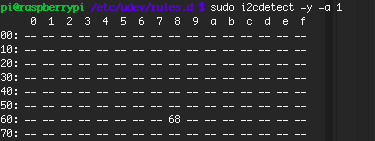I tried to check my Raspberry PI board with I2C connection. I have I2C DS1307 (Real Time Clock module) on hand. And after check the voltage on SDA/SDL pin out is 3.3v, safe for use with Raspberry PI board.
So, lets start with I2C. Install i2c-tools
pi@raspberrypi ~ $ sudo apt-get install i2c-tools
remove i2c-bcm2708 from modprobe blacklist
pi@raspberrypi ~ $ sudo nano -w /etc/modprobe.d/raspi-blacklist.conf
Then add i2c-bcm2708, i2c-dev into modules list.
pi@raspberrypi ~ $ sudo nano -w /etc/modules
And add following line
i2c-bcm2708 i2c-dev
Give all user access to i2c devices.
pi@raspberrypi ~ $ sudo touch /etc/udev/rules.d/99-i2c.rules
and add following line
SUBSYSTEM=="i2c-dev", MODE="0666"
Test all i2c module and check device on Raspberry PI
pi@raspberrypi ~ $ sudo modprobe i2c-bcm2708 pi@raspberrypi ~ $ sudo modprobe i2c-dev pi@raspberrypi ~ $ sudo udevadm trigger pi@raspberrypi ~ $ ls -l /dev/i2c*
pi@raspberrypi /etc/udev/rules.d $ ls -l /dev/i2c* crw-rw-rwT 1 root i2c 89, 0 Jan 15 11:07 /dev/i2c-0 crw-rw-rwT 1 root i2c 89, 1 Jan 15 11:07 /dev/i2c-1
Ok now, your Raspberry PI is ready for use with I2C.
Connect your DS1307 I2C module with Raspberry PI. And check that you’re success for talk with i2c.
For revision 1
pi@raspberrypi ~ $ sudo i2cdetect -y 0
For revision 2
pi@raspberrypi ~ $ sudo i2cdetect -y 1

If you get 68 as picture above. You’re good to go. If not check your connection and try again.
pi@raspberrypi ~ $ sudo modprobe rtc-ds1307
For revision 1
pi@raspberrypi ~ $ sudo bash # echo ds1307 0x68 > /sys/class/i2c-adapter/i2c-0/new_device # exit
For revision 2
pi@raspberrypi ~ $ sudo bash # echo ds1307 0x68 > /sys/class/i2c-adapter/i2c-1/new_device # exit
Now time to check time!
pi@raspberrypi ~ $ sudo hwclock -r Tue Jan 15 18:10:17 2013 -0.480690 seconds pi@raspberrypi ~ $ date Tue Jan 15 11:12:17 ICT 2013
hwclock -r will show clock from your RTC module. And ‘date’ will show current date from your Raspberry PI. Please note that you need to sync Raspberry PI date/time with internet first.
If the time from hwclock -r not correct compare with ‘date’ command. Use hwclock -w to write Raspberry PI time back to RTC module
pi@raspberrypi ~ $ sudo hwclock -w
Now your RTC module ready to use. My goal is done. I only wish to test I2C function. But if you want to always use time from RTC modules. Please use following stem.
pi@raspberrypi ~ $ sudo nano -w /etc/modules
and add rtc-1307 to end of the file
rtc-1307
and edit rc.local file to add RTC I2C address on startup
pi@raspberrypi ~ $ nano -w /etc/rc.local
And add following line to end of the file (Please change i2c-1 to i2c-0 if you use revision 1).
echo ds1307 0x68 > /sys/class/i2c-adapter/i2c-1/new_device



Hello,
at your Post above.
in /etc/modules.
rtc-ds1307 instead of rtc-1307 of yours. Right?
and,
After reboot PI,
pi@raspberrypi ~ $ sudo hwclock -r
hwclock: Cannot access the Hardware Clock via any known method.
hwclock: Use the –debug option to see the details of our search for an access method.
pi@raspberrypi ~ $ sudo hwclock -w
hwclock: Cannot access the Hardware Clock via any known method.
hwclock: Use the –debug option to see the details of our search for an access method.
pi@raspberrypi ~ $ sudo hwclock -s
hwclock: Cannot access the Hardware Clock via any known method.
hwclock: Use the –debug option to see the details of our search for an access method.
I can’t read/write/set hwclock as above.
So I can read/write/set it after run the following again,
pi@raspberrypi ~ $ sudo bash
# echo ds1307 0x68 > /sys/class/i2c-adapter/i2c-1/new_device
# exit
Now i can read/write/set it as the following.
pi@raspberrypi ~ $ sudo hwclock -s
pi@raspberrypi ~ $ sudo hwclock -r
Fri 25 Jul 2014 18:49:04 KST -0.097332 seconds
pi@raspberrypi ~ $ sudo hwclock -w
Conclusion:
Pi can not be set the HWCLOCK from DS1307 after reboot.
Any idea?
Thanks,
SB YIM